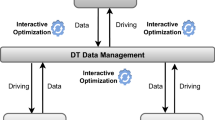Abstract
The Internet of Everything (IoE) has the potential to transform the way we live, work, and interact with the world around us. It involves the connection of billions of devices and sensors, generating vast amounts of data that can be used to inform decision-making, improve efficiency, and drive innovation. However, realizing the full potential of the IoE requires the adoption of open data practices, which can increase transparency, provenance, and accountability. This workshop aims to discuss pathways toward open data practices in the context of the IoE by bringing together practitioners in the field. The workshop will include intensive discussions with participants about their experiences with the publication of research data (including software) in the IoE context, but also challenges, concerns, and barriers to publishing research data. The workshop further addresses possible publication formats, how and where to publish data, questions of data ownership, as well as common formats and types. By discussing the state-of-the-art within the IoE community, we intend to draw conclusions on a path forward towards open data practices at venues, such as the IoE Con, as these practices have implications for future conference submissions, tracks, and review processes. Finally, by promoting open data practices, we can unleash the full potential of the IoE to create a more connected, smarter, and sustainable future.
Access this chapter
Tax calculation will be finalised at checkout
Purchases are for personal use only
Similar content being viewed by others
References
Barker, M., et al.: Introducing the fair principles for research software. Sci. Data 9(1), 622 (2022). https://doi.org/10.1038/s41597-022-01710-x
Beardsley, M., Hernández-Leo, D., Ramirez-Melendez, R.: Seeking reproducibility: assessing a multimodal study of the testing effect. J. Comput. Assist. Learn. 34(4), 378–386 (2018). https://doi.org/10.1111/jcal.12265
Borgman, C.L., Pasquetto, I.V.: Why data sharing and reuse are hard to do (2017). https://escholarship.org/uc/item/0jj17309
CHI: Papera - Quick Facts (2022). https://chi2022.acm.org/for-authors/presenting/papers/
European Union: European open science cloud (2023). https://eosc-portal.eu/
Hong, N.P.C., et al.: Fair principles for research software (FAIR4RS principles) (2022). https://doi.org/10.15497/RDA00065
ITiCSE: Call for papers (2023). https://iticse.acm.org/2023/call-for-papers/
Jay, C., Haines, R., Katz, D.S.: Software must be recognised as an important output of scholarly research. arXiv preprint arXiv:2011.07571 (2020)
Katz, D.S., Gruenpeter, M., Honeyman, T.: Taking a fresh look at fair for research software. Patterns 2(3), 100222 (2021). https://doi.org/10.1016/j.patter.2021.100222
Katz, D.S., Psomopoulos, F.E., Castro, L.J.: Working towards understanding the role of FAIR for machine learning. In: DaMaLOS, pp. 1–6 (2021). https://www.danielskatz.org/papers/FAIR4ML_for_DAMALOS.pdf
Kiesler, N.: Dataset: recursive problem solving in the online learning environment codingbat by computer science students (2022). https://doi.org/10.21249/DZHW:studentsteps:1.0.0
Kiesler, N.: Daten- und Methodenbericht Rekursive Problemlösung in der Online Lernumgebung CodingBat durch Informatik-Studierende. Technical report (2022). https://metadata.fdz.dzhw.eu/public/files/data-packages/stu-studentsteps$/attachments/studentsteps_Data_Methods_Report_de.pdf
Kiesler, N., Impagliazzo, J.: Perspectives on the internet of everything. In: Pereira, T., Impagliazzo, J., Santos, H. (eds.) IoECon 2022. LNICST, vol. 458, pp. 3–17. Springer, Cham (2023). https://doi.org/10.1007/978-3-031-25222-8_1
Kiesler, N., Pfülb, B.: Higher education programming competencies: a novel dataset. In: Iliadis, L., Papaleonidas, A., Angelov, P., Jayne, C. (eds) ICANN 2023. LNCS, vol. 14261, pp. 319–330. Springer, Cham (2023). https://doi.org/10.1007/978-3-031-44198-1_27, https://github.com/nkiesler-cs/HEPComp-Dataset
Kiesler, N., Schiffner, D.: On the lack of recognition of software artifacts and IT infrastructure in educational technology research. In: Henning, P.A., Striewe, M., Wölfel, M. (eds.) 20. Fachtagung Bildungstechnologien (DELFI), pp. 201–206. Gesellschaft für Informatik e.V., Bonn (2022). https://doi.org/10.18420/delfi2022-034
Kiesler, N., Schiffner, D.: Why we need open data in computer science education research. In: Proceedings of the 2023 Conference on Innovation and Technology in Computer Science Education, ITiCSE 2023, vol. 1. Association for Computing Machinery, New York (2023). https://doi.org/10.1145/3587102.3588860
National Science Foundation: Open data at NSF (2013). https://www.nsf.gov/data/
Pilat, D., Fukasaku, Y.: OECD principles and guidelines for access to research data from public funding. Data Sci. J. 6, OD4–OD11 (2007). https://www.oecd.org/sti/inno/38500813.pdf
Wilkinson, M.D., et al.: The fair guiding principles for scientific data management and stewardship. Sci. Data 3(1), 1–9 (2016). https://doi.org/10.1038/sdata.2016.18
Author information
Authors and Affiliations
Corresponding author
Editor information
Editors and Affiliations
Rights and permissions
Copyright information
© 2024 ICST Institute for Computer Sciences, Social Informatics and Telecommunications Engineering
About this paper
Cite this paper
Kiesler, N. (2024). Workshop: Towards Open Data Practices at the International Conference on the Internet of Everything. In: Pereira, T., Impagliazzo, J., Santos, H., Chen, J. (eds) Internet of Everything. IOECON 2023. Lecture Notes of the Institute for Computer Sciences, Social Informatics and Telecommunications Engineering, vol 551. Springer, Cham. https://doi.org/10.1007/978-3-031-51572-9_11
Download citation
DOI: https://doi.org/10.1007/978-3-031-51572-9_11
Published:
Publisher Name: Springer, Cham
Print ISBN: 978-3-031-51571-2
Online ISBN: 978-3-031-51572-9
eBook Packages: Computer ScienceComputer Science (R0)




